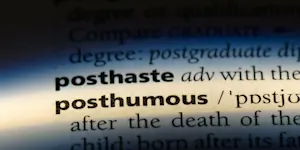What Makes This Word Tick
Ah, "elegy" — a word that rolls off the tongue like a somber sigh. It encapsulates sorrow and remembrance, often used in the context of poetry or music to express lamentation. This word brings to mind a profound reflection on loss and the beauty that can be found even in melancholy.
If Elegy Were a Person…
Elegy would be that thoughtful friend who always knows how to find the right words during difficult times. With a keen sense of nostalgia and an aura of quiet dignity, they’d be the first to pen a heartfelt note in a sympathy card.
How This Word Has Changed Over Time
Originally rooted in the Greek "elegos," meaning "song of lament," elegy has maintained its somber essence through the ages. However, its use has expanded beyond poetry to embody any reflective writing or music that conveys sorrow or mourning.
Old Sayings and Proverbs That Use Elegy
While there's no proverbial saying with "elegy" directly, you might encounter phrases like "singing the elegy" used historically to imply mourning through song. Timeless wisdom often acknowledges music's powerful role in processing grief.
Surprising Facts About Elegy
Did you know that famous poets like John Milton and Thomas Gray have penned notable elegies? Their works helped to define and popularize this poetic form, demonstrating the therapeutic impact of crafting sorrowful verse.
Out and About With This Word
You'll find "elegy" lingering in hushed cemetery paths, recital halls where mournful music fills the air, and in the pages of poetry books tucked away in dusty library corners. It's a word that accompanies us to moments of deep reflection and mourning ceremonies.
Pop Culture Moments Where Elegy Was Used
Elegies have appeared in contemporary music and films, like the ethereal "Elegy for Dunkirk" in the movie "Atonement." This word frequently makes guest appearances when creators aim to capture profound emotional moments.
The Word in Literature
Elegy has found a comfortable home in literature. It often surfaces in works that explore themes of mortality and remembrance, such as in the elegiac writings of Walt Whitman and Alfred Lord Tennyson. Authors use it to evoke contemplation and sorrow.
Moments in History with Elegy
The elegiac spirit resonated strongly after the World Wars, when poets and writers crafted elegies to honor lost lives and reflect on the devastation. These works gave voice to collective grief and the enduring hope for peace.
This Word Around the World
While in English, an "elegy" emphasizes mourning through words, many cultures have their own variations, such as the Japanese "eika," which similarly involves poetic lamentation. Whether in Italy or India, the essence of elegy reverberates globally in various forms.
Where Does It Come From?
The word "elegy" traces back to the Greek word "elegos," signifying a song of lament, and came into English usage through Latin. Though languages may differ, the power of mourning songs echoes universally.
How People Misuse This Word
Occasionally, people might confuse "elegy" with "eulogy." While both deal with death, an elegy is a mournful piece of writing, whereas a eulogy is a speech delivered in tribute at someone’s funeral.
Words It’s Often Confused With
Eulogy: A spoken tribute to someone who has died, not to be mistaken for a poetic lament.
Dirge: A somber song or tune expressing mourning, similar in emotion but often used in a musical context.
Lament: A passionate expression of grief, broader than the poetic form of an elegy.
Additional Synonyms and Antonyms
Synonyms for "elegy" include dirge, lament, requiem, and threnody. Its antonyms aren't as direct, but could be considered as celebration, jubilee, or delight — words that imply joy rather than mourning.
Want to Try It Out in a Sentence?
"When the old oak was cut down, the poet wrote an elegy to mourn the loss of such a venerable and steadfast fixture of the garden."
















